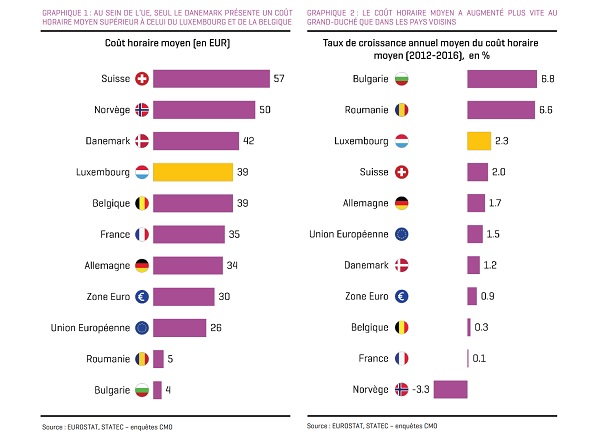 Credit: Eurostat, Statec
Credit: Eurostat, Statec
A Statec report has found the average hourly labour cost in Luxembourg to be €39.
The average hourly labour cost remains high in Luxembourg compared to the European (€26) and Euro zone (€30) averages. According to the Statec report, this has resulted from Luxembourg's employment structure, which is more focused on high value-added services.
Nevertheless, in some sectors of activity such as industry and construction, the cost of labour was found to be lower than that of neighbouring countries. While average hourly costs have increased more rapidly (2.3% per annum) than the average for the euro area over the 2012-2016 period, this was also mainly due to the greater increase in costs in certain sectors such as the financial sector and the administrative and support services activities.
Moreover, the average hourly cost of the economy as a whole is higher in Luxembourg than in neighbouring countries, albeit not in all sectors of activity. Indeed, the cost per hour actually worked remains lower in Luxembourg than in the three neighbouring countries in the construction (€26) and industry (€34) sectors. In other sectors, the costs in the Grand Duchy lie between those of neighbouring countries. It is only in three sectors, namely financial and insurance activities (€71), health and social work (€39) and transport (€35), that Luxembourg exceeds the costs of the three neighbouring countries.
By breaking down the total cost of labour, Luxembourg remains one of the countries in Europe with a very low indirect cost share (13% versus 22% on average for EU). The indirect cost is mainly constituted by the social contributions paid by the employer, and to a lesser extent by training, recruitment, work clothes, etc. as well as in some countries by labour taxes. In the EU, Malta is the only country with an even lower percentage (6%) than Luxembourg, while in France the share of indirect costs is the highest (33%).
The direct cost is formed by gross wages and salaries. Most of this direct cost is the regular wages paid each month. Nevertheless, remuneration in kind and non-regular remuneration (eg end-of-year bonuses, performance bonus, etc.) can be significant. In Luxembourg, remuneration in kind represents on average 2.9% of the total cost (compared to 0.9% on average for the EU and the euro zone), whilst non-payable wages represent 7.9% (compared to 5.7% in the EU and 7.2% in the euro zone).








